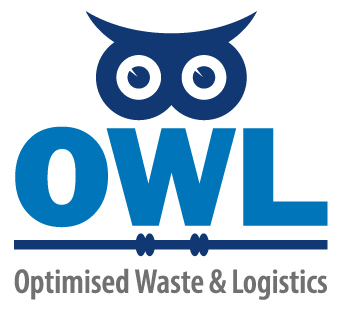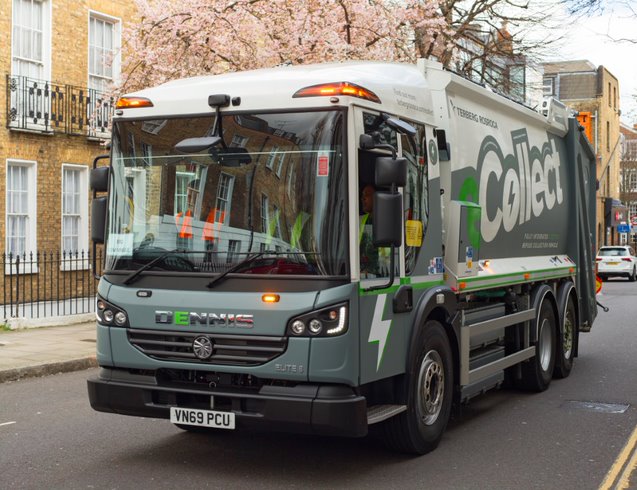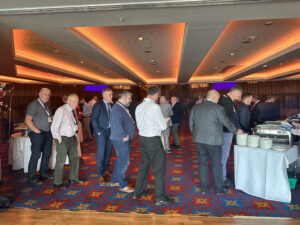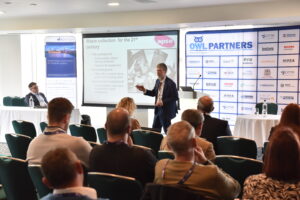Dennis Eagle designed the 26-tonne 6×2 eRCV for urban collection rounds where its zero-emissions and drastically reduced noise levels are most needed.
The vehicle has been designed with enough capacity to drive and operate the chassis, body and bin lift all day long without needing recharging.
Dennis Eagle designed the RCV with the slim version of the Elite chassis with rear-steer and the Olympus narrow body to create a vehicle that is more manoeuvrable and agile in tight urban spaces.
Coupled with the faster acceleration of the electric vehicle, this has already been shown to save significant time on rounds.
The company presents the eCollect as the first all-electric eRCV produced by an original equipment manufacturer (OEM). Kevin Else, Managing director for Dennis Eagle, pointed out that this vehicle is not new. At least, most of it is not.
‘There are two essential reasons for that,’ he said Managing Director Kevin Else.
‘First, the chassis, body and bin lift are intentionally not new. The Elite, Olympus and Terberg ‘Omni’ combination represents our best-selling RCV, but the critical point is that our customers have already tried and tested each part.
‘We have replaced the diesel engine and associated parts with an electric drive system. Of course, that alone is a massive feat, but it’s considerably less to deal with than producing a whole new vehicle from scratch. And it provides welcome reassurance and familiarity to our customers.
‘Developing this vehicle was all about providing a zero-carbon alternative to our conventional RCVs. But it had to be a genuine option, so it had to be at least as efficient and cost-effective as the comparable diesel model. And that’s what we’ve achieved.
‘Secondly, OEM-produced vehicles are advantageous even more so when it has an entirely new power system.
‘Customers understand the benefits of having all components made by one manufacturer. They also realise how a one-stop-shop makes communication so much easier, reduces lead times and helps meet delivery schedules. Additionally, having the chassis, body and bin lift specially designed to work together improves efficiency.
‘But one significant benefit of an OEM-produced vehicle that sometimes goes unseen is the incredible amount of trial that goes into producing it. Every component we use has been explicitly retested on this vehicle. The hydraulics, the brakes, the suspension, all have been re-approved for use on the eCollect.
‘It’s been tested in a broader range of weather conditions than it is likely to encounter in the UK and driven relentlessly over different terrains to match a lifetime’s wear and tear.
‘Functional safety alone – which includes introducing every conceivable fault to the software running the vehicle and then making sure it still behaves safely and appropriately – this has taken thousands of hours of work.
‘We’ve dotted all the ‘I’s and crossed all the ‘T’s, and we have only just released it to the market. And when the truck does go into operation, it will not only match the efficiency and cost-effectiveness of its diesel counterparts, but it will also have the same safety and reliability that are all hallmarks of the Dennis Eagle brand.’
The vehicle is charged using the most widely available CCS2 connection and either fixed or mobile chargers. Many variables determine how long recharging takes, including how much residual charge the battery has and how powerful the charger is but typically, it will take 7-8 hours a night for a full recharge. Fast charges are available too, and the vehicle also recharges quickly to 80%.
The low-entry Elite cab will be familiar to drivers and crews. It’s the same one that was given the highest score of any cabin on the road in Transport for London’s Direct Vision Standard assessment. But it does have new features relating to the new drive system and additional safety elements.
The switch from diesel to high voltage electric power is accompanied by a fundamentally new approach to cab safety. The key here is that there is no high voltage electricity supply going to or from the eCollect cab.
Instead, instruments including the electric heater and air conditioning are powered by a safer low voltage supply.
Cab switches and indicators are similar to the conventional vehicle. Still, the standard instrument cluster includes features that are only optional on the diesel vehicle, including parking and seatbelt warnings as well as the handbrake and ‘leaving the cab’ signs.
Additional instrumentation relating to the electric drive system includes a light to indicate when the vehicle is recovering energy, and the fuel gauge is replaced by a ‘State of Charge’ indicator. There is also an economy gauge to show how well the vehicle is being driven.
The driver also has more control of the reverse audible warning, which is muted between 11 pm, and 7 am, along with the beacon lights. The interface with the body and bin lift is the same, but some of the information on the body screen is also reported in front of the driver.
A significant optional extra is the new factory-fitted 5 Camera DVR Recording System, part of Dennis Eagle’s Safety Solutions range, which provides unrivalled protection for crews, public and operators by seeing and recording everything happening around the vehicle. Images are displayed on an additional screen in the cab, and the system is fully supported too.
All this data and more is also available in real-time in the operator’s office through DE-Connect, which is fitted and functioning on every eCollect before it leaves the factory.
As for driving, the vehicle is just like an automatic with drive, neutral and reverse gears and brake and accelerator pedals.
The driver is given an amber warning light in the shape of a tortoise if the battery charge falls below a certain level. This warning indicates that waste operators should stop collections and return to the depot to recharge.
It doesn’t automatically slow the vehicle down but does restrict the torque which can result in it going slower.
Drivers, crews and fitters will all be trained to operate and maintain the eCollect. Still, the introduction of a new electric-powered vehicle makes safety training vital for all staff who will have any degree of contact with the RCV.
Dennis Eagle engineers have been thoroughly trained in high voltage (HV) safety and additionally trained electric vehicle experts are in place in each Dennis Eagle Service Centre. Safety protocols and safe working systems for workshops have also been devised.
Even after this training, however, only HV trained Dennis Eagle engineers will be authorised to work on the high voltage components of the vehicle in the immediate future.
Warranties are the same as for conventional vehicles, and extended warranties are available from the outset. Packages for repair and maintenance and the specialist cleaning of HV electrical components are also available.
Finally, before the eCollect went into production, all spare parts were in stock and fully listed on the company’s electronic parts catalogue.
‘Our staff were trained, suppliers primed and plans made to increase production,’ said Kevin Else.
‘I’m sure our customers will be as excited by the eCollect as we are.’



